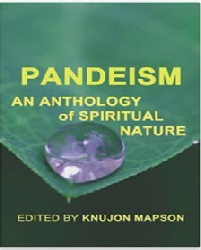Introduction
“Is God willing to prevent evil, but not able? Then he is not omnipotent.
Is he able, but not willing? Then he is malevolent.
Is he both able and willing? Then whence cometh evil?
Is he neither able nor willing? Then why call him God?”
~ Epicurus
In 1927, Bertrand Russell challenged the veracity of Christianity. In 2020, I will challenge the veracity or, at least, the attractiveness of Pandeism. If you listen carefully, you will hear Senator Lloyd Bentsen’s voice: “I knew Bertrand Russell. Bertrand Russell was a friend of mine. Ms. Foley, you're no Bertrand Russell.” That is true, Senator Bentsen’s ghost; nevertheless, I write in deference to Mr. Russell’s “Why I Am Not a Christian.”
How serendipitous that Knujon Mapson’s invitation arrived for the “natural spirituality” edition of PANDEISM: An Anthology for nature was the starting and ending point of my relationship with God. At the outset, I would like to make explicit my biases formerly known as implicit: God would be the Creator of all that is; God would be singular; and God would be good ~ always, not just occasionally. I believed in a Creator God: if God merely stumbled upon an eternally existing universe, then what would make god God? I was a monotheist; but, I could throw monotheism out the window as long as however many gods that be were good. Question: Why would someone worship a non-good God? Answer: cowardice or a resonant not-goodness. I believe in standing up for goodness. If God does not, then phooey on God. I could not throw goodness out the window. Slightly rewording Meister Eckhart: “Goodness is something so noble that if God could turn aside from it, I could keep the goodness and let God go.” And so I did.
I wanted God to be good. For two decades, I believed that God was good. For two decades, I tried to believe that God was good. Now, I don’t believe that there is a good God; but, I would love to be proven wrong. Good? Good for whom? Good measured by what means? Good for and measured by the creation to whom a Creator God would hold a fiduciary responsibility, especially to sentient beings in creation. When I was young, creation meant the Earth, perhaps other planets in our solar system, and any life forms throughout the Milky Way. My mind was not yet overwhelmed by multiverses and holograms. In my preferred multiverse, St. Isaac of Syria would be correct: "In love did God bring the world into existence; in love is God going to bring it to that wondrous transformed state, and in love will the world be swallowed up in the great mystery of the one who has performed all these things; in love will the whole course of the governance of creation be finally comprised." In our actual universe, as best I can perceive it, I think St. Isaac of Syria was overly optimistic: The Big Bang was a magnificent but not particularly loving event. Creation is wondrous; but, also, stricken with onerous diseases and natural disasters. The Big Crunch or Freeze or Rip will swallow up the world in a manner decidedly devoid of love.
Natural evil slayed my belief in a good God and any attraction I may have had for Pantheism or Pandeism.


